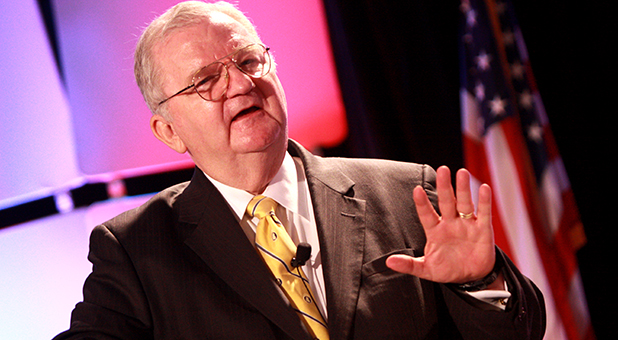RNC’s Own Rules May Limit GOP Nomination to One of These 2 Guys
Tuesday, a member of the Republican National Committee’s Standing Committee on Rules wrote a lengthy article about the rules surrounding the GOP’s presidential nomination process.
Virginia National Committeeman Morton Blackwell—founder and president of the Leadership Institute—wrote the article titled “The Coming Trainwreck” for Florida hedge fund manager Rod Martin’s personal blog. In it, he not only details how the nomination field is now effectively already locked in for the national convention in Cleveland, but how the RNC’s lawyers blocked his efforts in January to amend the rules.
“Changed or not, the rules of the Republican Party will have huge effects not expected or predicted by any of the national pundits who make their livings now commenting on the Republican presidential nomination contest,” he wrote. “Some surprising aspects of these effects are already becoming better known. A greater number of people have recently learned that, as the national rules now stand, no delegate votes cast for any presidential candidate will be counted in the tally of first ballot votes unless that candidate had earlier demonstrated his support from a majority of the delegations from at least eight states or territories.”
Blackwell said that’s exactly what happened at the 2012 Republican National Convention in Tampa. No votes for any candidate other than Mitt Romney were counted in the final tally of the votes on the first and only ballot, which “caused a great uproar and many hard feelings,” resulting in large numbers of delegates returning home “furious.”
“They had come to Tampa to cast their votes for other candidates, but their votes weren’t even counted,” he wrote. “The Romney campaign used the power of the incoming presidential nominee in the national convention’s Rules Committee to impose a great many rules changes, including a change that had the intended effect of eliminating the counting of votes for anyone but Romney. [He] was the only candidate who could demonstrate the support of a majority of delegates in at least eight states, and a rules change he pushed through prohibited even the counting of delegate votes for any other candidate.”
That particular rule, Rule 40(b), remains in effect today. And as a result, it could mean the GOP nomination is “locked in” between either current front-runner Donald Trump or U.S. Sen. Ted Cruz (R-Texas). They are the only candidates with more than one state delegate majority with the winner-take-all states coming up beginning next Tuesday.
Blackwell said that while Rule 40(b) would likely infuriate many delegates whose votes won’t count—right now, 22 have been awarded to candidates who have since dropped out of the race, but the number will go up if others drop out—it wouldn’t have much impact if a candidate arrives at the national convention with 1,237 or more pledged delegates. But if no candidate has a majority of the delegates before the convention begins, it could cause big problems, he said.
“In fact, as it now stands, the same Romney-created rule, Rule 40(b), that prevents votes from being tallied for candidates who could not prove majority support from at least eight state delegations also provides that candidates must prove that they meet the eight-state threshold ‘not less than one (1) hour prior to the placing of the names of candidates for nomination pursuant to this rule and the established order of business’,” he wrote. “In other words, when the first ballot begins, no additional candidates can qualify to receive votes that will be counted. Only candidates who meet the eight-state threshold required to receive votes that count on the first ballot can receive votes that count on subsequent ballots.
“Under the current rules, therefore, it’s nonsense to talk about any candidate coming from behind to win the nomination unless that candidate meets the eight-state threshold before the first ballot, much less to talk about breaking a possible convention deadlock by nominating anyone who is not right now a candidate for the nomination.”
Blackwell also explained the process through which he worked with the RNC’s chief counsel to amend Rule 40(b) to allow for all delegates’ votes to count. Initially, it was amended, he said, but party leadership apparently didn’t like the changes and had them removed.
There are ways the rule can still be amended to allow for a floor nomination in Cleveland, but all of those processes would be seen publicly as gaming the system to produce an intended result.
“Unfortunately, the January RNC meeting in South Carolina was the last time it was likely to be possible to make changes dispassionately based on what is fair and best for our party in the rules governing the nomination process at the coming convention,” Blackwell concluded. “Now every proposed rule change will be evaluated by the effect it would have on the respective candidates still in the nomination contest.”














































